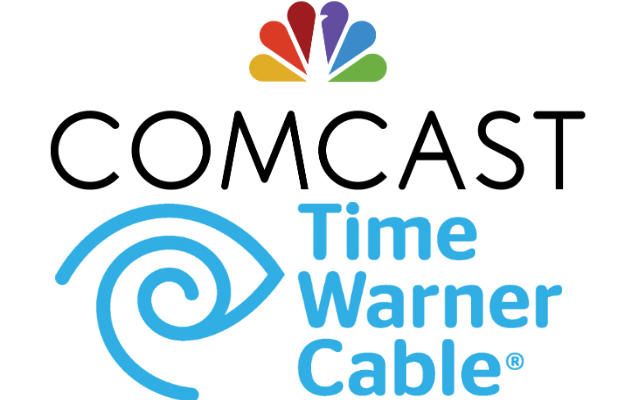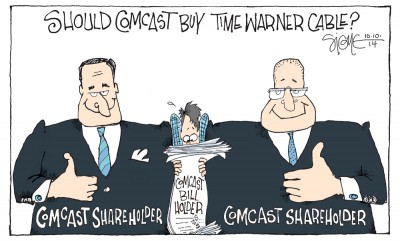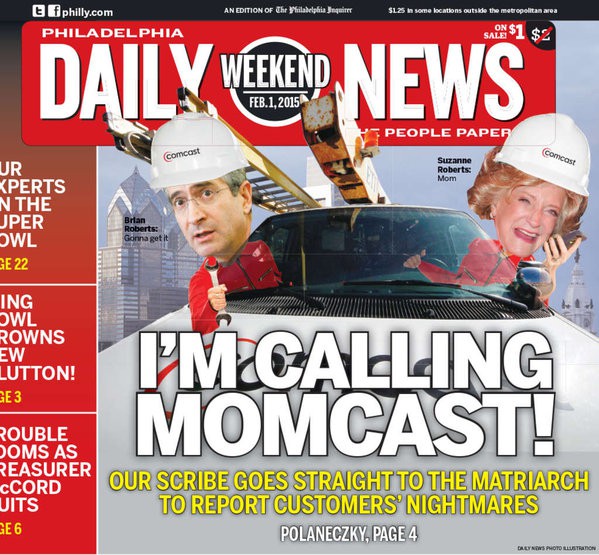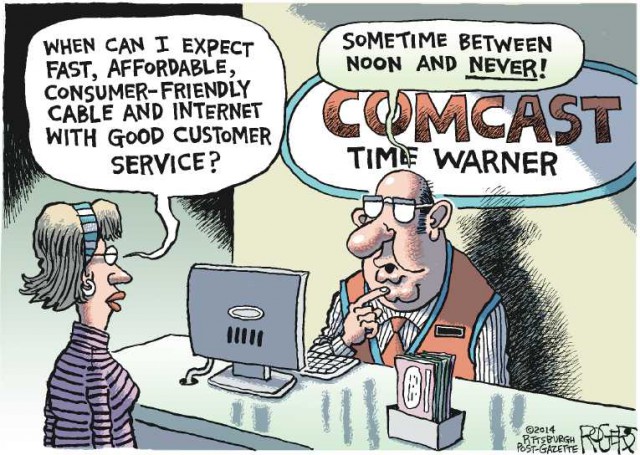 Staff attorneys that have reviewed details of the Time Warner Cable/Comcast merger proposal are prepared to make a recommendation as early as next week that the Department of Justice should block the deal because it is anti-competitive and anti-consumer.
Staff attorneys that have reviewed details of the Time Warner Cable/Comcast merger proposal are prepared to make a recommendation as early as next week that the Department of Justice should block the deal because it is anti-competitive and anti-consumer.
The staff in the Justice Department’s antitrust division have spent more than a year reviewing documents submitted by both cable companies to determine what impact the merger would have on the cable television and broadband landscape.
Bloomberg News today reported the attorneys did not like what they saw and believe the merger would harm consumers. For the first time, a cable company merger deal was reviewed not so much for its impact on cable television programming, but on broadband.
When the Federal Communications Commission redefined broadband as an Internet connection of at least 25Mbps, Comcast suddenly found itself the largest broadband provider in the country. If the merger with Time Warner Cable is approved, Comcast will have a 56.8 percent market share of U.S. broadband customers, far exceeding any other provider.
In upstate New York, Comcast would have more than a 75% market share — nearly 9o% if you just consider non-Verizon FiOS areas. In California, Comcast would control more than 80% of the market, not only picking up Time Warner Cable customers, but Charter customers in Southern California as well.
Comcast and Time Warner Cable have argued competition is not affected because the two companies never compete with each other. But a de facto broadband monopoly could allow Comcast to raise rates at will and bring a return to usage-related billing. It would also discourage new competitors from entering the market – particularly those relying on broadband to deliver video services, and hand Comcast more leverage to force compensation from online content companies like Netflix.
 Under consideration by the Justice Department:
Under consideration by the Justice Department:
- Whether the combined entity would have too much control over nationwide broadband Internet delivery;
- whether Comcast could use its financial influence to strike exclusive cable deals that could keep programming off other platforms;
- whether Comcast could limit how programming is delivered through video streaming services (usage caps, etc.);
- if Comcast complied with terms under a previous merger deal with NBCUniversal.
Renata Hesse, a deputy assistant attorney general for antitrust, will take the analysis and ultimately decide, along with the division’s top officials, whether to file a federal lawsuit to block the deal. Bloomberg reports lawyers at the Justice Department have contacted outside parties to collect evidence to strengthen their potential case against the merger.
Another clear sign the merger is not being received well inside the Justice Department and the Federal Communications Commission is a complete lack of negotiations with Comcast over possible concessions to make the deal less anti-competitive. That also happened with the AT&T/T-Mobile merger where negotiations to ease anticompetitive concerns never seriously got off the ground before the Justice Department sued to block the deal. The FCC quickly announced its own opposition later that same day.
A lawsuit does not necessarily kill the merger deal. Comcast could take its case to federal court to win approval over the objections of the Justice Department. The company might also counter-propose new concessions to address concerns raised by the lawsuit.
After learning of today’s Bloomberg News story, spokespeople at both Comcast and Time Warner Cable are either confident or in denial:
“There is no basis for a lawsuit to block the transaction,” said Sena Fitzmaurice, a Comcast spokeswoman. The merger “will result in significant consumer benefits — faster broadband speeds, access to a superior video experience, and more competition in business services resulting in billions of dollars of cost savings.”
Time Warner Cable spokesman Bobby Amirshahi said “we have been working productively with both DOJ and FCC and believe that there is no basis for DOJ to block the deal.”


 Subscribe
Subscribe Californians get a reprieve from the menacing Comcast-Time Warner Cable merger with an announcement from the California Public Utilities Commission it is putting further consideration of the merger deal on hold until later this spring.
Californians get a reprieve from the menacing Comcast-Time Warner Cable merger with an announcement from the California Public Utilities Commission it is putting further consideration of the merger deal on hold until later this spring. Charter Communications is in talks with Si Newhouse, Jr., the billionaire owner of Bright House Networks, to acquire the cable operator in an all-stock deal that could be worth over $12 billion, according to a report by Bloomberg News.
Charter Communications is in talks with Si Newhouse, Jr., the billionaire owner of Bright House Networks, to acquire the cable operator in an all-stock deal that could be worth over $12 billion, according to a report by Bloomberg News. “While we have had conversations with many parties about this transaction, we do not have an agreement with anyone regarding future plans for Bright House,” a company spokeswoman said in the statement.
“While we have had conversations with many parties about this transaction, we do not have an agreement with anyone regarding future plans for Bright House,” a company spokeswoman said in the statement.
 Even PR damage control marketing experts now consider Comcast hopeless.
Even PR damage control marketing experts now consider Comcast hopeless.
 Are you still paying $15+ for HBO and $13+ for Cinemax? Stop.
Are you still paying $15+ for HBO and $13+ for Cinemax? Stop.